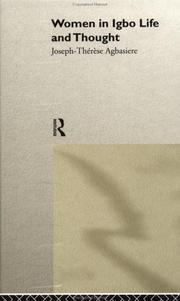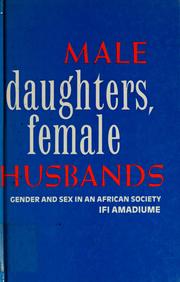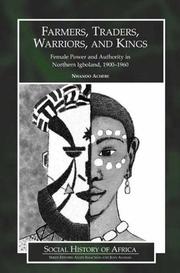| Listing 1 - 10 of 12 | << page >> |
Sort by
|
Book
ISBN: 0253005078 9780253005076 9780253355386 0253355389 9780253222480 0253222486 Year: 2011 Publisher: Bloomington
Abstract | Keywords | Export | Availability | Bookmark
 Loading...
Loading...Choose an application
- Reference Manager
- EndNote
- RefWorks (Direct export to RefWorks)
Women, Igbo --- Sex role --- Igbo (African people) --- Kings and rulers
Book
ISBN: 1498544290 9781498544290 9781498544283 Year: 2017 Publisher: Lanham, Maryland
Abstract | Keywords | Export | Availability | Bookmark
 Loading...
Loading...Choose an application
- Reference Manager
- EndNote
- RefWorks (Direct export to RefWorks)
Women, Igbo. --- Women immigrants. --- African diaspora. --- Women in community development

ISBN: 0415227038 0415227046 Year: 2000 Publisher: London : New York : Routledge,
Abstract | Keywords | Export | Availability | Bookmark
 Loading...
Loading...Choose an application
- Reference Manager
- EndNote
- RefWorks (Direct export to RefWorks)
Women, Igbo. --- Philosophy, Igbo --- Femmes ibo --- Philosophie Ibo --- #SBIB:39A73 --- #SBIB:316.346H20 --- Etnografie: Afrika --- Positie van de vrouw in de samenleving: algemeen --- Philosophy, Igbo. --- Women, Igbo --- Igbo women --- Women, Igbo (African people) --- Igbo philosophy --- Philosophy, Igbo (African people)
Book
ISBN: 1280127090 9786613530950 1552384969 1552382680 9781280127090 9781552384961 Year: 2010 Publisher: Calgary [Alta.] : University of Calgary Press,
Abstract | Keywords | Export | Availability | Bookmark
 Loading...
Loading...Choose an application
- Reference Manager
- EndNote
- RefWorks (Direct export to RefWorks)
"A century ago, agriculture was the dominant economic sector in much of Africa. By the 1990s, however, African farmers had declining incomes and were worse off, on average, than those who did not farm. Colonial policies, subsequent 'top-down' statism, and globalization are usually cited as primary causes of this long-term decline. In this unprecedented study of the Igbo region of southeastern Nigeria, author Chima Korieh points the way to a more complex and inclusive approach to this issue. Using agricultural change as a lens through which to view socio-economic and cultural change, political struggle, and colonial hegemony, Korieh shows that regional dynamics and local responses also played vital roles in this era of transformation. British attempts to modernize the densely populated Igbo region were focused largely on intensive production of palm oil as a cash crop for export and on the assumption of male dominance within a conventional western hierarchy. This colonial agenda, however, collided with a traditional culture in which females played important social and political roles and male status was closely tied to yam cultivation. Drawing on an astonishing array of sources, including oral interviews, newspapers, private journals, and especially letters of petition from local farmers and traders, Korieh puts the reader in direct contact with ordinary people, evoking a feeling of what it was like to live through the era. As such, the book reveals colonial interactions as negotiated encounters between officials and natives and challenges simplistic notions of a hegemonic colonial state and a compliant native population."--P. [4] of cover.
Igbo (African people) --- Women, Igbo --- Agriculture --- Agriculture and state --- History. --- Social conditions. --- Economic conditions. --- Social aspects --- Great Britain --- Colonies
Book
Year: 2010 Publisher: Calgary : University of Calgary Press,
Abstract | Keywords | Export | Availability | Bookmark
 Loading...
Loading...Choose an application
- Reference Manager
- EndNote
- RefWorks (Direct export to RefWorks)
A century ago, agriculture was the dominant economic sector in much of Africa. By the 1990s, however, African farmers had declining incomes and were worse off, on average, than those who did not farm. Colonial policies, subsequent 'top-down' statism, and globalization are usually cited as primary causes of this long-term decline. In this unprecedented study of the Igbo region of southeastern Nigeria, Chima Korieh points the way to a more complex and inclusive approach to this issue. Using agricultural change as a lens through which to view socio-economic and cultural change, political struggle, and colonial hegemony, Korieh shows that regional dynamics and local responses also played vital roles in this era of transformation. British attempts to modernize the densely populated Igbo region were focused largely on intensive production of palm oil as a cash crop for export and on the assumption of male dominance within a conventional western hierarchy. This colonial agenda, however, collided with a traditional culture in which females played important social and political roles and male status was closely tied to yam cultivation. Drawing on an astonishing array of sources, including oral interviews, newspapers, private journals, and especially letters of petition from local farmers and traders, Korieh puts the reader in direct contact with ordinary people, evoking a feeling of what it was like to live through the era. As such, The Land Has Changed reveals colonial interactions as negotiated encounters between officials and natives and challenges simplistic notions of a hegemonic colonial state and a compliant native population.
Igbo (African people) --- Women, Igbo --- Agriculture --- Agriculture and state --- History --- Social conditions --- Economic conditions --- Social aspects --- Economic conditions. --- Social conditions. --- History. --- Social aspects.
Book
Year: 2010 Publisher: Calgary : University of Calgary Press,
Abstract | Keywords | Export | Availability | Bookmark
 Loading...
Loading...Choose an application
- Reference Manager
- EndNote
- RefWorks (Direct export to RefWorks)
A century ago, agriculture was the dominant economic sector in much of Africa. By the 1990s, however, African farmers had declining incomes and were worse off, on average, than those who did not farm. Colonial policies, subsequent 'top-down' statism, and globalization are usually cited as primary causes of this long-term decline. In this unprecedented study of the Igbo region of southeastern Nigeria, Chima Korieh points the way to a more complex and inclusive approach to this issue. Using agricultural change as a lens through which to view socio-economic and cultural change, political struggle, and colonial hegemony, Korieh shows that regional dynamics and local responses also played vital roles in this era of transformation. British attempts to modernize the densely populated Igbo region were focused largely on intensive production of palm oil as a cash crop for export and on the assumption of male dominance within a conventional western hierarchy. This colonial agenda, however, collided with a traditional culture in which females played important social and political roles and male status was closely tied to yam cultivation. Drawing on an astonishing array of sources, including oral interviews, newspapers, private journals, and especially letters of petition from local farmers and traders, Korieh puts the reader in direct contact with ordinary people, evoking a feeling of what it was like to live through the era. As such, The Land Has Changed reveals colonial interactions as negotiated encounters between officials and natives and challenges simplistic notions of a hegemonic colonial state and a compliant native population.
Igbo (African people) --- Women, Igbo --- Agriculture --- Agriculture and state --- History --- Social conditions --- Economic conditions --- Social aspects --- Economic conditions. --- Social conditions. --- History. --- Social aspects.
Book
Year: 2010 Publisher: Calgary : University of Calgary Press,
Abstract | Keywords | Export | Availability | Bookmark
 Loading...
Loading...Choose an application
- Reference Manager
- EndNote
- RefWorks (Direct export to RefWorks)
A century ago, agriculture was the dominant economic sector in much of Africa. By the 1990s, however, African farmers had declining incomes and were worse off, on average, than those who did not farm. Colonial policies, subsequent 'top-down' statism, and globalization are usually cited as primary causes of this long-term decline. In this unprecedented study of the Igbo region of southeastern Nigeria, Chima Korieh points the way to a more complex and inclusive approach to this issue. Using agricultural change as a lens through which to view socio-economic and cultural change, political struggle, and colonial hegemony, Korieh shows that regional dynamics and local responses also played vital roles in this era of transformation. British attempts to modernize the densely populated Igbo region were focused largely on intensive production of palm oil as a cash crop for export and on the assumption of male dominance within a conventional western hierarchy. This colonial agenda, however, collided with a traditional culture in which females played important social and political roles and male status was closely tied to yam cultivation. Drawing on an astonishing array of sources, including oral interviews, newspapers, private journals, and especially letters of petition from local farmers and traders, Korieh puts the reader in direct contact with ordinary people, evoking a feeling of what it was like to live through the era. As such, The Land Has Changed reveals colonial interactions as negotiated encounters between officials and natives and challenges simplistic notions of a hegemonic colonial state and a compliant native population.
Igbo (African people) --- Women, Igbo --- Agriculture --- Agriculture and state --- History --- Social conditions --- Economic conditions --- Social aspects --- Economic conditions. --- Social conditions. --- History. --- Social aspects.

ISBN: 0862325951 0862325943 9780862325947 9780862325954 9781783603336 178360333X 9781783603343 1783603348 1350221252 Year: 1989 Publisher: London Zed Books
Abstract | Keywords | Export | Availability | Bookmark
 Loading...
Loading...Choose an application
- Reference Manager
- EndNote
- RefWorks (Direct export to RefWorks)
An early study of queer theory and non-Western feminism, challenging the concept of gender.
Sociology of the family. Sociology of sexuality --- Nigeria --- Women, Igbo --- Igbo (African people) --- Femmes ibo --- Ibo (Peuple d'Afrique) --- Woman-to-woman marriage --- Women, Igbo. --- Sex role --- Social life and customs. --- Rôle selon le sexe --- Social life and customs --- Moeurs et coutumes --- Igbo (African people) -- Social life and customs. --- Sex role -- Nigeria. --- Woman-to-woman marriage -- Nigeria.

ISBN: 0325070784 0325070792 0325070784 Year: 2005 Publisher: Portsmouth, NH : Heinemann,
Abstract | Keywords | Export | Availability | Bookmark
 Loading...
Loading...Choose an application
- Reference Manager
- EndNote
- RefWorks (Direct export to RefWorks)
Women, Igbo --- Igbo (African people) --- Femmes ibo --- Ibo (Peuple d'Afrique) --- History --- Social conditions. --- King and rulers. --- Social life and customs. --- Histoire --- Conditions sociales --- Rois et souverains --- Moeurs et coutumes --- Nsukka (Nigeria) --- Politics and government.
Book
ISBN: 9781783603329 1783603321 9780862325947 9781783603336 9781783603343 Year: 2022 Publisher: London Zed
Abstract | Keywords | Export | Availability | Bookmark
 Loading...
Loading...Choose an application
- Reference Manager
- EndNote
- RefWorks (Direct export to RefWorks)
In 1987, more than a decade before the dawn of queer theory, Ifi Amadiume wrote Male Daughters, Female Husbands, to critical acclaim.This compelling and highly original book frees the subject position of 'husband' from its affiliation with men, and goes on to do the same for other masculine attributes, dislocating sex, gender and sexual orientation. Boldly arguing that the notion of gender, as constructed in Western feminist discourse, did not exist in Africa before the colonial imposition of a dichotomous understanding of sexual difference, Male Daughters, Female Husbands examines the structures in African society that enabled people to achieve power, showing that roles were not rigidly masculinized nor feminized.At a time when gender and queer theory are viewed by some as being stuck in an identity-politics rut, this outstanding study not only warns against the danger of projecting a very specific, Western notion of difference onto other cultures, but calls us to question the very concept of gender itself.
Igbo (African people) --- Sex role --- Woman-to-woman marriage --- Women, Igbo --- Gender studies --- Ibo (peuple d'Afrique) --- Rôle selon le sexe --- Femmes ibo. --- Homosexuels --- Social life and customs --- Moeurs et coutumes. --- Mariage --- #SBIB:39A73 --- #SBIB:39A11 --- Female husbands --- Gynaegamy --- Gynegamy --- Woman-marriage --- Marriage --- Igbo women --- Women, Igbo (African people) --- Etnografie: Afrika --- Antropologie : socio-politieke structuren en relaties --- Gender role --- Sex (Psychology) --- Sex differences (Psychology) --- Social role --- Gender expression --- Sexism --- Gender roles --- Gendered role --- Gendered roles --- Role, Gender --- Role, Gendered --- Role, Sex --- Roles, Gender --- Roles, Gendered --- Roles, Sex --- Sex roles --- Moeurs et coutumes
| Listing 1 - 10 of 12 | << page >> |
Sort by
|

 Search
Search Feedback
Feedback About UniCat
About UniCat  Help
Help News
News